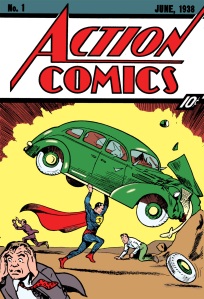Scott McCloud wrote, “Perception affects who will enter comics, as reader or creator. It affects the decisions of those in position to help comics as an art form and industry. And it affects those in position to do it harm.” (McCloud, 2000).

McCloud goes on to explain how the public perception of comics is also one that assumes a permanent tie of comics with children. This perception of comics has remained a constant as the media and retailers seem to derail any efforts to convince the public of the rich media content and cultural significance of comics. The strong public perception of the link between kids and comics could be linked to the association of comics with the “Superhero” theme as Superman was introduced by Action Comics in 1938. Due to this, the general opinion of comics since is one of the lowest of popular culture media.
In 1954, american psychiatrist Dr. Frederic Wertham published his book Seduction of the Innocent. He further solidified the public perception of comics as he argued that “comics were harming American children, leading them to juvenile delinquency and to lives of violence, drugs and crime.” (Wertham, 1954). He also made the claim “that the violent and unsavory actions and questionable sexual exploits depicted in comics encourages like-minded behavior in children.” (Wertham, 1954). In 2013, the New York Times published an article entitled “Scholar Finds Flaws in Work by Archenemy of Comics“. Written by Dave Itzkofffeb, the article quotes a scientific study from Dr. Carol L. Tilley, which suggested Wertham “misrepresented his research and falsified his results,” and that Wertham “manipulated, overstated, compromised and fabricated evidence, ‘particularly in the interviews he conducted with his young subjects’.” (Itzkofffeb, 2013). The influence to discredit comics as a legitimate form of literature was strongly felt by a few such as Wertham, which sadly influenced many.
As the digital age exploded in the late 90’s up through the current culture, the common printed narrative also exploded through transmedia storytelling. The digital revolution provided an opportunity to tell a story across multiple platforms using digital technology. The most common form recently has been the mainstream adaptation of popular DC Comics and Marvel comic narratives into movie form. While there are arguments on both sides of the fence regarding these adaptations, they have provided an avenue to open the public perception of the genre and audiences have been a diverse mix of young and old alike. Digital reader apps by major comic book production companies have been released for iPad, Nook, Kindle, and others allowing for a deeper penetration of the market and easy access. Webcomics have also seen an exciting growth, many gaining noted public attention.
When McCloud published his first book, Understanding Comics: The Invisible Art, it started a scholarly interest due in part to his passion about the form and interpretation of comics. This interest has spurred an active scholarly conversation about the form of comics, the language it uses to communicate, the way in which it engages the readers, and its cultural, social, and historical impact. I’ve personally taken two classes already in which comics are the major focus of critical analysis, hence this website as a part of the result.
The boy in me will forever hold the fond memories and perceptions I have from my youth while reading them. The adult I am now enjoys the challenge of critical review and analysis as I explore the medium of my youth through a different lens. When I break any medium down to its most basic form — movies, books, songs, tv, comics — they are all version of the same phenomenon that make up a part of what it is to be human; telling a story.
I’d agree that comics have become far more wide-spread. However, I’m not sure I agree with you about the effect of the movie lines. While I think they have changed the public’s opinion on the the value and depth of super-hero stories, I’m not sure that extends to comics themselves. The spin-offs and comic lines branching from the Marvel movies still aren’t generally acknowledged.
LikeLike
You made some great points! I love your use of evidence throughout. Your point on how comics are always linked to children reminds me of Japanese Manga. In Japan, you can find manga for all ages and all genres. I think that marvel movies can be effective in that way too, turning comic books into something for everyone.
LikeLike